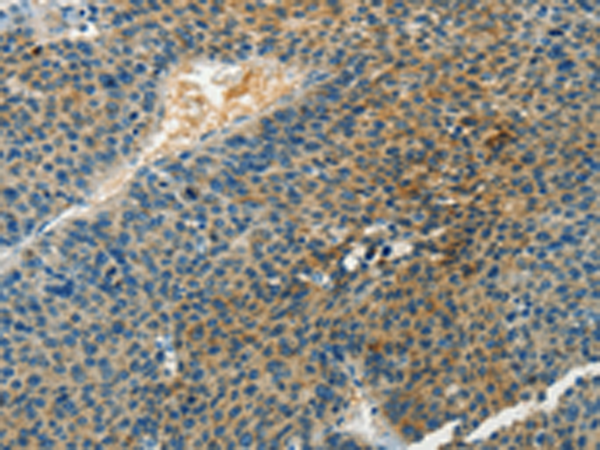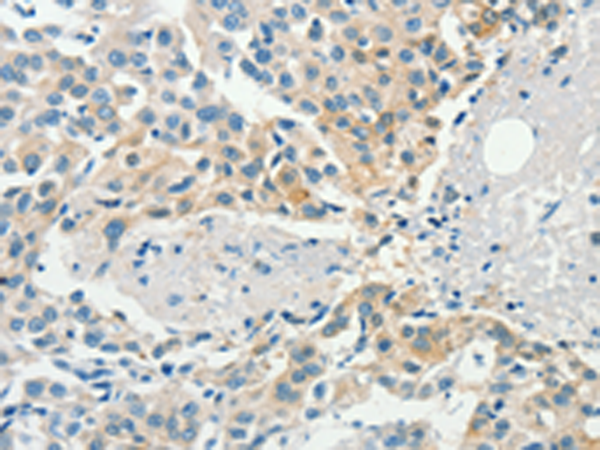

| WB | 咨询技术 | Human,Mouse,Rat |
| IF | 咨询技术 | Human,Mouse,Rat |
| IHC | 1/50-1/200 | Human,Mouse,Rat |
| ICC | 技术咨询 | Human,Mouse,Rat |
| FCM | 咨询技术 | Human,Mouse,Rat |
| Elisa | 1/1000-1/5000 | Human,Mouse,Rat |
| Aliases | DGK; DAGK2; DGK-BETA |
| Host/Isotype | Rabbit IgG |
| Antibody Type | Primary antibody |
| Storage | Store at 4°C short term. Aliquot and store at -20°C long term. Avoid freeze/thaw cycles. |
| Species Reactivity | Human, Mouse, Rat |
| Immunogen | Synthetic peptide of human DGKB |
| Formulation | Purified antibody in PBS with 0.05% sodium azide and 50% glycerol. |
+ +
以下是关于DGKB抗体的参考文献示例(注:以下为模拟内容,实际文献需通过学术数据库查询):
1. **文献名称**:*"Diacylglycerol kinase β regulates lipid metabolism and progression in renal cell carcinoma"*
**作者**:Yamamoto K, et al.
**摘要**:通过DGKB特异性抗体分析肾癌细胞系及组织样本,发现DGKB通过调节脂质信号通路促进肿瘤生长,其表达水平与患者生存率显著相关。
2. **文献名称**:*"DGKB-dependent signaling pathways in hippocampal neuronal development"*
**作者**:Chen L, et al.
**摘要**:利用DGKB抗体进行免疫染色和Western blot,证实DGKB在小鼠海马神经元突触可塑性中起关键作用,敲除后导致认知功能缺陷。
3. **文献名称**:*"Altered DGKB expression in type 2 diabetes: Insights from adipose tissue analysis"*
**作者**:Martinez R, et al.
**摘要**:研究通过DGKB抗体检测2型糖尿病患者的脂肪组织,发现DGKB表达下调与胰岛素抵抗相关,提示其在脂质代谢紊乱中的病理作用。
4. **文献名称**:*"Development and validation of a high-specificity DGKB monoclonal antibody for autoimmune disease studies"*
**作者**:Sato T, et al.
**摘要**:报道一种新型DGKB单克隆抗体的制备与验证,应用于类风湿性关节炎模型,证明DGKB通过调节T细胞活性参与炎症反应。
建议通过**PubMed/Google Scholar**以“DGKB antibody”或“diacylglycerol kinase beta”为关键词检索最新文献。
The DGKB antibody targets diacylglycerol kinase beta (DGKB), an enzyme encoded by the *DGKB* gene, which belongs to the diacylglycerol kinase (DGK) family. DGKB catalyzes the conversion of diacylglycerol (DAG) to phosphatidic acid (PA), a critical step in regulating lipid-mediated signaling pathways. By modulating DAG and PA levels, DGKB influences cellular processes such as membrane trafficking, cell proliferation, and apoptosis. It is particularly abundant in the brain, where it plays a role in neuronal development, synaptic plasticity, and neurotransmitter release, though it is also expressed in immune cells, adipose tissue, and other organs.
DGKB dysfunction has been implicated in metabolic disorders, immune dysregulation, and neurological conditions. Studies link altered DGKB activity to insulin resistance, obesity, and bipolar disorder, highlighting its therapeutic potential. The DGKB antibody is a key tool for investigating these roles, enabling detection and quantification of DGKB protein in tissues or cells via techniques like Western blot, immunohistochemistry, or flow cytometry. Researchers use it to explore DGKB's expression patterns, post-translational modifications, and interactions with signaling molecules. Validated antibodies are essential for specificity, often confirmed through knockout controls or blocking peptides. As interest grows in lipid signaling and metabolic diseases, the DGKB antibody remains vital for elucidating DGKB's physiological and pathological mechanisms.
×